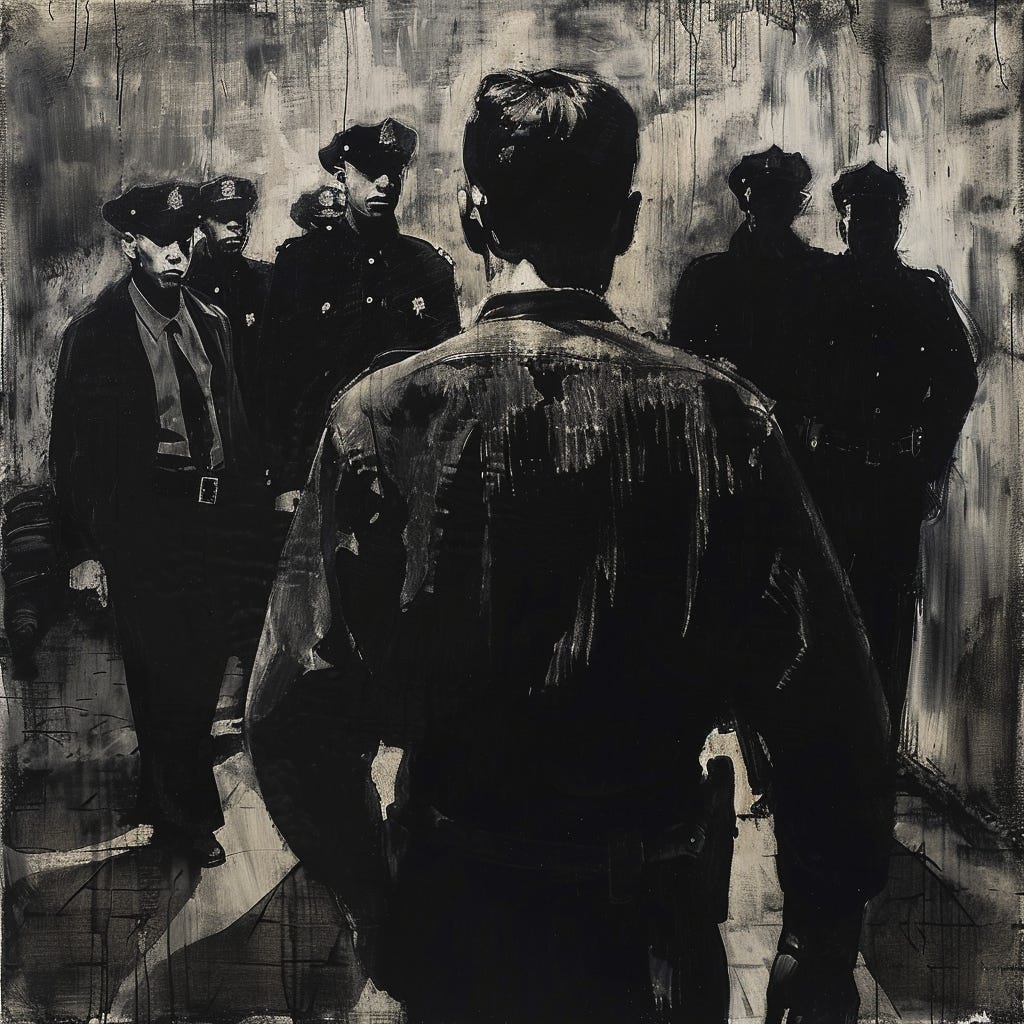The News: On Definitions
Wednesday's Child Is Full of Woe
I really dislike arguments in the social sciences (or the wider public sphere) that center on definitions of a particular term where the issue is whether that term applies to a particular case or not.
I’m like many historians in this respect, temperamentally inclined to a sort of nominalism. Definitions are a temporary stabilization of the subject matter being discussed, a way to synchronize yourself with an existing scholarly conversation. They’re not statements about a rigorously real, fixed, unchanging universal truth, to be adjudicated via the gathering of empirical data. Even natural scientists find themselves recognizing sometimes that the words they use are mutable as the conversation changes: they decide that something that was a planet isn’t, that maybe what we mean by “species” isn’t quite what we thought it was, and so on.
I’m more interested in extended fights within the public sphere about definitions, because I think they’re always about something else than the definition itself. Sometimes that’s an attempt to avoid applying a legal judgment or penalty to conduct that seems to merit it, or an attempt to evade some general obligation to act. Sometimes it’s a narrower thing: a particular institution, academic discipline, or interested party is trying to preserve their authority or control over an issue or policy via insisting that their definition is the only proper or accurate one. Or even more narrowly, it’s an ego thing: a particular individual or policy-maker has staked their professional reputation on a definition and they’re going all-out to win the argument.
I think John Ganz is right about the motives behind the lengthy, sprawling debate about the definition of “fascism” and whether it’s the same as Trumpism. Sometimes I am not sure what the underlying cause of an extended slapfight about definitions might be. I suspect that at least some of the time, fighting on definitions is a way for people who want to minimize, excuse or dismiss a serious problem to do that without having to take on the risks of substantively saying so. This is also a point that John Ganz makes.
I’m even less interested than Ganz in trying to wade in on the other side of the definition fight and dig in on, “Trumpism IS fascism, can’t you see?” There are other analogies (not definitions) that provide insight on what’s going on in the United States (and elsewhere). I’m fond of pointing to the 1948 election in South Africa to talk about how a party that loses the popular vote in an electorate that is disproportionately weighted towards the most conservative populations within the electorate can not only win a critical election but use that victory to immediately make any opposition to their control over the government nearly impossible. I think there are other moments of transition to a more capriciously authoritarian style of rule in democracies that yield insights into the present moment, including Rodrigo Duterte in the Phillipines and Silvio Berlusconi in Italy. You can stockpile analogies all day for insights without fixating on one of them as the one true description of a contemporary situation.
Some of the people who fastidiously insist that Trumpism is not fascist or not even an “ism” of its own are trying to defend the proposition that whatever is bad about Trump is continuously and undifferentiatedly bad about all conservatism or even about the dominant hegemonic systems of the global system for the last 50, 75 or one hundred years. This sort of view is kind of a small subset of a long-ranging argument between large-scale structural histories and small-scale or microhistorical studies that privilege contingency and change in their narratives. The bigger the scale and the more structural the analysis, the more that it seems that the only changes worth crediting as changes are huge, epochal ruptures. The smaller the scale, the more that we’re inclined to create new words or descriptors with promiscuous energy, every single time that anything feels different on a day-to-day basis. So there are intellectuals on the left who have dug in hard to insist that Trump is not new, not distinctive, and no more of a threat than any other conservative ever was. Much the same way that Perry Anderson, for example, dug in hard after 9/11 and said that there was no real change in American hegemony as the Iraq War loomed and no special urgency to mobilize against it.
The point in those cases, I guess, is a view that if you were mobilized before, stay mobilized, and to conceive of any struggle as a long one against a highly ‘structural’ opponent. (I think in a few notable cases the point is also just intense stubbornness and an unwillingness ever to revise a prior opinion.) In practice, that feels like saying, “If recent events have spurred you to mobilize, we don’t want you, because you didn’t see it was just as bad before now.” It feels at the least like bad politics, a kind of vanguardist exclusivity. But it also feels wrong. It may be that there is a “big history” perspective with intellectual and factual integrity that reduces the struggles of a given microhistorical moment to nothing more than a small blip against a huge and lengthy landscape of injustice and suffering, but that is not where we live as human beings, it’s not what motivates us to fight for a better world. Politics is not a game for brains in jars, for intellects vast and cool and unsympathetic.
On the other side of things, I can’t help but feel that some ostentaciously centrist or center-right thinkers who try to contest the use of “fascism” as a term, or deny that Trumpism represents a new kind of catastrophic risk to American society or democracy, are moving to create a possible bridge to that catastrophic future that will be just wide enough for the prescient apologists to stomach moving onto the side of a Trumpist regime. I don’t know if that’s a diagnostic sign of fascism exactly, because pre-emptive ass-covering pseudo-sycophancy is a pretty widespread attribute among people are looking out for Number One any time a possible regime change is in the air. To some extent, that happened in the last Trump Administration when perhaps he didn’t yet represent a fully materialized “ism”: some Republican respectables held their nose and decided they could keep him under control. That didn’t work. Which might be precisely why Trump has found his way to something much more like a movement.
The centrist and center-right figures trying to dampen down the alarm and divert talk of “fascism” aren’t planning to take appointments in the next Trump Administration, which is good for them, because the only people who are going to be in official roles are 100% guaranteed loyalists with far-right credentials in hand. There might be a few Albert Speers who sneak in the side door (hey, look, a fascist analogy) and rise up because they have actual skills besides kissing Trump’s ass and burning the country down, but that’s not what the minimalizers are after.
What some of them are trying to do is the same proactive maneuver that mainstream liberals pulled during McCarthyism. Always make sure you’ve got a good supply of people in your world to point the finger at where you can say to the cops or the goon squad, “That guy over there is the Communist, get him.” Then you stay in place at least, or hey, maybe get a promotion. You don’t have to be a card-carrying Trumpist, you just have to be able to say with a straight face that you also thought that cancel culture was a bad problem, that immigration was out of control, that the legal system was controlled by liberal elites, that urban cosmopolitans just didn’t value American culture enough, that Trumpists have some totally valid points and so on. You don’t have to win the race, just run faster than the other guys. Which is easier if you position yourself to trip them.
I don’t vest my opposition to what is happening and what may yet happen in a mere definition—nothing happens in my mind if I say “it’s fascism, then” versus saying “Maybe not fascism”. To me, it’s a matter of a descriptive list. When I make that list, I defy the minimalizers to tell me I’m over-reacting. I defy the cool and unsympathetic vanguardist to tell me “always has been” or “heighten the contradictions”.
The list goes something like this:
Spectacular cruelty and contempt towards women, expressed not just as sentiments, enacted not just as sexual assault, but programmatically encoded into policy on reproductive rights, legal proceedings, and much else;
Aggressive, overt contempt for the rule of law, with unambiguous intent to dramatically erode or outright remove the remaining ways that American law might restrain the powerful, while also planning to use carceral power to harm political enemies for no reason other than they are enemies;
Comprehensive rejection of anything like expert knowledge or factual information in the making of policy or participating in public debate, aggressive embrace of unrestrained lying as normal and acceptable behavior;
Willingness to threaten and very likely commission mob violence and extrajudicial coercion against perceived enemies and vulnerable targets;
Desire to remove formal and bureaucratic safeguards around the security of elections, real contemplation of suspension of Constitutional democracy altogether;
Credible reports of plans to coordinate a nationwide police and military response to any public protests or resistance to Trumpist power;
Stated plans to engage in massive deportation of people identified as undocumented residents, with accompanied musing about including other groups or people in deportations;
Serious planning to destroy state capacity via lay-offs and submitting the remainders of a civil service to some form of loyalty oath to the regime;
Aggressive expansion of fossil-fuel production, sell-offs of federal land, and near-elimination of environmental regulation;
My list goes on from there. On and on and on. The war in Ukraine, where a Trumpist US will plainly encourage Russia’s victory. The plausible end of NATO and the withering of US participation in any international cooperation or interstate institution. The conduct of the current Israeli government, which will certainly be as unchecked or more so under Trump—indeed, it could likely become even more authoritarian and violent and meet with the approval of his regime.
I don’t care what we call any of that as long as we call it not only bad but comprehensively worse than bad. As bad as we’ve known, and bad in some ways we’ve not known. If someone vested in a definitional fight wants to jump from that arena into mine and tell me:
no, come on, most of that is just silly blather, they’re not going to really do any of it
no, that’s not so bad
no, all of that is exactly the way things are already and have been for a long time,
then my heart will be in the trim.
Because whatever you want to call what we are standing on the possible edge of, it’s not business as usual. Your ass-covering apologetics will not protect you, your dreams of domesticating the monsters are folly. There is not a revolutionary pony hiding in the mountains of shit that are now flowing towards the seats of power.
Image credit: Photo by Romain Vignes on Unsplash
Image credit: "Nashville MAGA Rally 5-29-18" by southerntabitha is licensed under CC BY-NC-ND 2.0.






Well said. So well, in fact, that it convinced me to become a paid subscriber. I particularly like "create new words or descriptors with promiscuous energy." It seems to me that is precisely the intellectual work that small-scale studies that "privilege contingency and change in their narratives" aim to do. Your list is the antidote to the foolish consistency powering so much of the debate over the terms we use to have debates when we should be directing our energy toward finding concrete steps to change the minds of persuadable voters, ways to introduce the possibility of change to those too cynical to let themselves do the one thing that could make a difference in the outcome or too busy to notice the stakes.
Good list (1-9), which are sounding similar to the griviences in the Declaration of Independence. And note the key sentence in the Declaration that applies today:"He has refused his Assent to Laws, the most wholesome and necessary for the public good." That is where we are today.